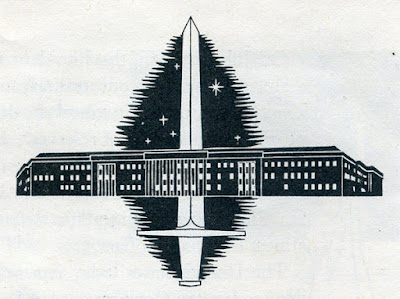NATIONAL DEFENSE
This is part 14 of the pamphlet "OUR FOREIGN POLICY 1952":
NATIONAL DEFENSE
HERE at home the defense establishment is a major support of our foreign policy. In our democratic system, military power supports, but does not shape, our policies. The responsibility for maintaining the military forces that the country needs is put, by law, into the hands of the Secretary of Defense. But in practice it is often Congress that shapes our defense by de-ciding how much to appropriate for it and by limiting its appropriations to certain specific purposes. When the Republic of Korea was attacked, the United Nations was able to prevent a quick communist con-quest of the country because the United States had defense forces in the vicinity. We were able, in the face of appalling difficulties, to strike a retaliatory blow and, although greatly outnumbered, to resist the aggressor while we mobilized further. 59 On July 19, 1950, the President proposed an imme-diate expansion of our military establishment. The President's program involved the drafting of new man-power, calling up the reserves. It involved doubling the defense budget so that by June we were spend-ing at the rate of 30 billion dollars a year. The budget for fiscal 1953 provides for defense expenditures of almost 60 billion dollars. The United States today is a major military power not because the Government has become militarized or because its people have developed aggressive intentions. They have chosen to arm themselves and other free people because they are determined not to live out their lives under the domination of a foreign power.
NATIONAL DEFENSE
HERE at home the defense establishment is a major support of our foreign policy. In our democratic system, military power supports, but does not shape, our policies. The responsibility for maintaining the military forces that the country needs is put, by law, into the hands of the Secretary of Defense. But in practice it is often Congress that shapes our defense by de-ciding how much to appropriate for it and by limiting its appropriations to certain specific purposes. When the Republic of Korea was attacked, the United Nations was able to prevent a quick communist con-quest of the country because the United States had defense forces in the vicinity. We were able, in the face of appalling difficulties, to strike a retaliatory blow and, although greatly outnumbered, to resist the aggressor while we mobilized further. 59 On July 19, 1950, the President proposed an imme-diate expansion of our military establishment. The President's program involved the drafting of new man-power, calling up the reserves. It involved doubling the defense budget so that by June we were spend-ing at the rate of 30 billion dollars a year. The budget for fiscal 1953 provides for defense expenditures of almost 60 billion dollars. The United States today is a major military power not because the Government has become militarized or because its people have developed aggressive intentions. They have chosen to arm themselves and other free people because they are determined not to live out their lives under the domination of a foreign power.

Comments